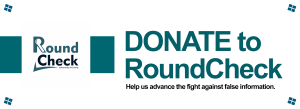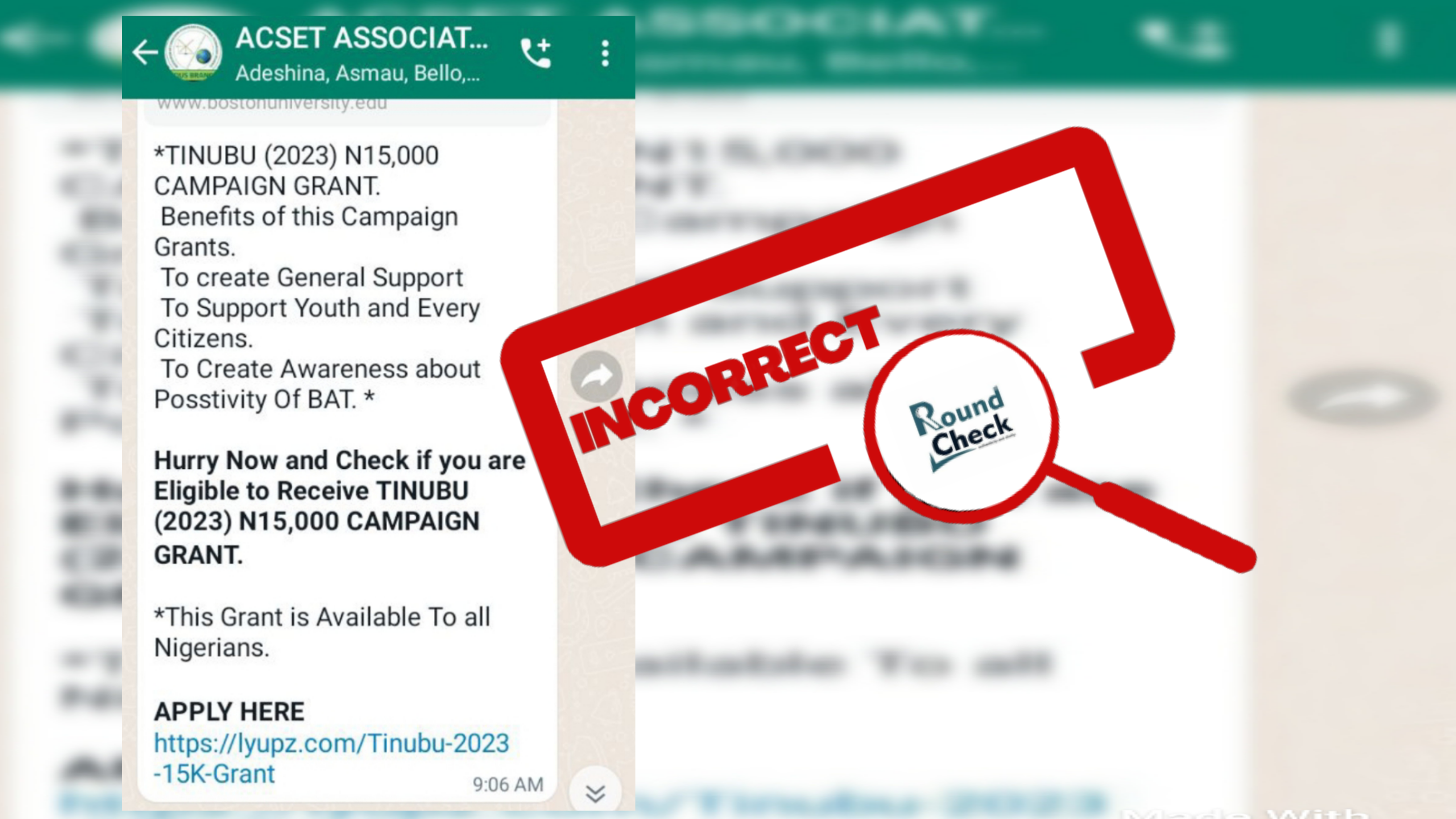|
Getting your Trinity Audio player ready...
|
From scholarships to visa lotteries and giveaways, scammers are finding their way to target you through WhatsApp groups, and sometimes via direct messages.
These scams have a similar pattern used to lure innocent, unsuspecting members of the public; and sometimes desperate people fall for them.
But how? These scams, which may also include jobs, grants, airtime and data rewards usually have a text attached to them. At times, the exclamation mark is one of the red flags to look out for.
Also, grammatical errors can be alarming, just as a piece of advice to forward the message to your friends can be. Some also have capitalized words to arrest your attention (E.g when you see a message with ‘SHARE THIS TO YOUR FRIENDS’).
Not many people understand that these viral messages are scams, sent out to steal the personal information of anyone who will be a victim of the bait.
ROUNDCHECK has observed that some of these schemes pose as a government agency or a well-known company. Sometimes, the messages are accompanied by the name of a popular politician or a personality— even with a familiar logo.
For instance, in 2020, in an attempt to prey on the impoverished people of Nigeria, a broadcast message circulated that the Federal Government approved N8,000 as relief fund for its citizens. We checked and discovered that it was a scam.
Also, in May 2022, a fake website went viral that vice president Yemi Osinbajo was sharing N33,000 to Nigerians as campaign support.
These fake websites often use trending issues as bait to capture the attention of the people.
Take for example in November 2022 when the Japa syndrome among the Nigerian youths was a public discourse, a fake Canada visa lottery application went viral on social media.
Similarly, prior to Nigeria’s 2023 election, ROUNDCHECK stumbled upon a fake website link that poses as a recruitment portal for the Independent National Electoral Commission.
Besides, don’t be surprised when a fake website has a domain name of a popular website you’re quite familiar with; the reason being that these scam websites are being developed by hackers.
In fact, some token websites are not created with the intent to steal your personal information – but they are also harmful.
Phishing websites, on the other hand, are more dangerous because they can easily hack into your account or steal your login details, according to cybersecurity experts.
But these fake websites don’t just spread by themselves. After filling in an application and claiming whatever reward is being promised, applicants are requested to share the link to at least 5 WhatsApp groups or 15 friends. This could have translated to a finding which revealed that phishing and scams hit 174 percent in Nigeria as cybercrimes recorded a massive rise in the first six months of 2022.
Phishing Website Will Take You To Where You Don’t Know
ROUNDCHECK has dedicated some time to alerting social media users of trending fake sites. In the course of doing this, we have found out that some phishing websites sometimes change domain names.
For instance, a claim circulated with a link and while working on it, our fact-checker discovered that after duly following the registration process, instead of receiving an email, applicants are redirected to another website link that’s also fake.
But don’t be surprised though that these malicious websites are mostly human-driven. That means these fake website links are created by some people that want to hijack your account.
Investigating Suspicious Websites Using Verification Tools
Scamadviser and Whois are common website verification tools we have used to analyse suspicious websites. ROUNDCHECK had observed that malicious websites often have low ratings and several spammers and scammers use the same registrar.
By using Whois, a database that makes it easy to find a website owner, we have found out that malicious websites often hide some of their identities.
Also, Scamadviser, a platform known for validating the authenticity of websites, will show negative highlights of malicious websites and raise the alarm that such a fake website has recently been set up.
The website verification tool will also reveal if a website has only been registered recently and if it hasn’t had a lot of visitors or if a website has been placed for sale. These are potential red flags indicating that a website is used for dubious purposes.
Previous checks by ROUNDCHECK have also revealed that links with “lyupz” are fake and designed to steal the personal details of members of the public.
Cyber Experts Wade In
Cybersecurity experts confirmed that phishing websites are created to trick Internet users and steal their personal information.
“It (phishing website) is a form of social engineering (use of cunning ways to acquire information) whereby a potential victim is tricked into losing valuable information through responding to a message”, says Ibrahim Suleiman, a cybersecurity expert.
He added that “It usually involves the victim taking an immediate action.”
Mr Suleiman further noted that fake sites use LYUPZ to impersonate authentic websites and hide information.
“It’s just a conned format for impersonation. Usually, LYUPZ is a program that shortens URLs or web addresses. So, most times, instead of writing a very long website link or address, LYUPZ helps to shorten it. It is Legit, but those thieves use it to mask (hide) some info that might sell them out.”
Also, a data analyst, MohammeduRobiu Yekini noted that Internet users can detect suspicious websites by looking at its URL.
His words: “In Nigeria for instance, all governmental parastatal websites end in .gov.ng.; military organizations end with mil.ng. while educational institutions end with .edu.ng.
“Another way is to check if the website is safe and secure. You can do that by checking if the website begins with HTTPS://. If the website begins with HTTP:// without the ‘s’, avoid giving out sensitive information on such a website.”
Mr Yekini however advises that internet users set up multi-factor authentication on all accounts.








